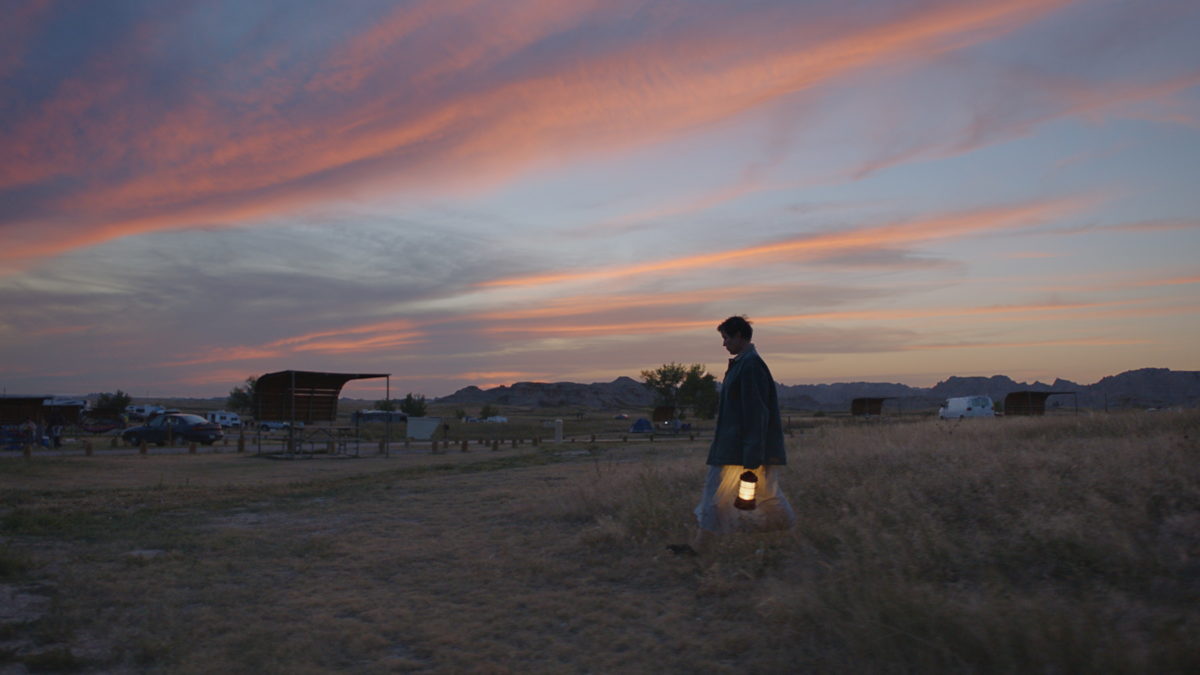“Inevitably there’s grief and loss,” but how does a middle-aged woman respond to an economic crisis that pulled the rug from under her feet? In Chloé Zhao’s Nomadland, Fern (Frances McDormand) lost her husband, packed away her stuff in a storage unit, even saw her ZIP code discontinued. With it, her housing disappeared as well, so she sees no other option than to move into her RV. Although it goes by the name of Vanguard the van—reminiscent of the lonesome cowboy and his horse—she soon calls it home.
A bit sceptical at first, Fern is convinced by a friend to come and listen to a man named Bob Wells—who plays himself in the film—preach about the nomad lifestyle she’s about to adopt, in his ‘Rubber Tramp Rendezvous’ boot camp where he swiftly turns the attendees into a commune of vagabonds. Stories, free stuff and practical suggestions go around the table. Sure, being able to replace a tire and owning a spare one are essential to living in your vehicle, driving through the American desert. The question is whether using Elizabethan verses—Fern quotes Shakespeare’s Macbeth twice—or being heavily perfumed by Ludovico Einaudi’s score is as essential to the film.
Fern is sensitive to Boot Camp Bob’s speech (“I may have spent too much of my life remembering, Bob”), and so she endeavours to build a home in the little space she has in the back of her van, ready to start anew. To get by she has to make a deal with the devil from time to time, wrapping up boxes in an Amazon factory as part of its CamperForce program, to which she adds a number of odd jobs such as harvesting beets, grilling burgers or selling rocks.
Through these sequences, the film touches upon a number of (general) systemic issues, such as housing, healthcare and job opportunities, though Zhao brushes only quickly past them, mostly leaving the critical note unstruck (indefinitely). Seeing a woman during lunch break showing off her biceps—tightly fitted in the sleeves of an Amazon polo shirt, smiling wildly underneath her Amazon cap—forms a consolation of sorts. Other subtle puns are aplenty, but it is not on these socio-political observations that Zhao builds her film. The emphasis rather lies on the emotional and internal journey, depicted by stark close-ups alternated with wide landscapes. The manual labour recurring throughout the film and the family gatherings at the end—where Fern re-enters ‘normal’ life—contrapose rather uncomfortably an invariable solitude. Even the hint of an budding love story feels warm yet uneasy and strangely impossible.
To her family, Fern is the odd woman out, always more interested in “what’s out there,” as her sister says at the family barbecue. But did Fern choose to be an outsider? Is she continuing an American nomadic tradition, as her sister once again says so proudly yet sad? Hard to tell and most likely only an ambivalent answer would settle the argument. She is warmly welcomed back into her sister’s home, though the discomfort in Fern’s eyes gives away her will to find another kind of freedom—not one of financial or material ease.
Apart from these internal questions, the film wonderfully grasps the individual and more practical truth of being on the road where foldable chairs, cold nights and shitting in a bucket are the norm; the image of three men in trunks, sitting in the sun, all of them petting a small dog on their lap, is the warmest example. To a lesser extent Nomadland highlights the part of the American nomadic lifestyle that is not a choice, where wages are low, social security hardly existent and where Amazon gleefully provides you with an insurance for accidental death or dismemberment. It is a difficult exercise in balancing utter pain (losing a loved one, losing a home) and complete happiness (breakfast in the mountains, sunset through a linen dress), yet Zhao keeps a straight line, never really straying too far in either direction.
Though it is based on the 2017 non-fictional book by Jessica Bruder, bearing the same title, Zhao constructs the reality of her source material around a fictional character (Fern). Not being present in the book, nor appearing to refer to anyone who is, the question remains where the name came from. (Do ferns grow in the Amazon?) The book’s central figure is Linda May, who in the film (again, as herself) introduces Fern to the nomad-clan and its chief Bob Wells, handing over the leading role to Frances McDormand, though staying by her side throughout the film. Other figures from the book make their appearance in the film, though the focus lies on the individual aura of Fern. Not conveying a clear political or social commentary, nor attempting to cover the entire span of Bruder’s book, Zhao is honouring the truth in accepting that the myriad battles Fern faces aren’t all fought out at once. The same goes for Fern’s friend who tells a story about a man who worked his entire life so he could buy a boat when retiring. He bought his boat alright, though the poor man died before it ever left the driveway. “So,” the woman says, “at least I have my boat [referring to her RV] right here with me in the desert.”
